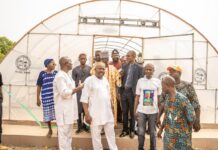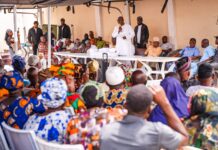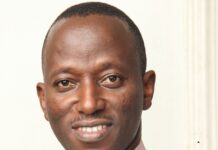Last week, President Muhammadu Buhari agreed to come out of his cocoon. He granted two interviews between the space of 48 hours, albeit pre-recorded, to Channels TV and the NTA. Since then, the interviews have again provoked discussions on the state of the mind of the president.
Upon returning from a seven-week medical trip to the UK in 2017, the mind of the president became a cause for national concern. Since he came into office in 2015, either via covert claim of going to the UK for “a summit and scheduled medical follow-up” or actually seeking leave, ostensibly to meet his medics, the president is recorded to have been to his infirmary in about nine times and spent over 200 days abroad attending to his health.
Buhari’s hermitic life, sequestered inside the Villa and his incoherent responses whenever he speaks, have literally been taken as a national fait accompli. Sufferable people that Nigerians are, they have since moved on, after ceaseless ponders and discussions on it.
In seeking explanation, I went into Yoruba people’s explanation of their cosmos. To seek answers to their cloudy and sometimes seemingly inexplicable world, proverbs, riddles, wise sayings, aphorisms and pithy descriptions of things most times come to the rescue. These help them to gain insight into the realm of the unseen and to break down and simplify issues that seemed too difficult for them to understand.
Significant events and stories that took place in the past, told and retold over and over again, also became handy and easily deployed to explain happenings that surround them. One of such is the line, “Elo n’koko? Ara omo le.” Chipped off a conversation between a woman clay pot seller and her customer which happened many years ago in an ancient Yoruba village, the line has become an age-long description of what psychologists call cognitive dissonance.
Aware that villages were crammed with people battling existential situations that could manifest in maladies, mental disconnect, amnesia, dementia and all that, with the attendant risks posed to communal living, Yoruba prescribe some irreducible minimum codes in social interactions. For instance, they say that the benchmark of where a cap must stop on its wearer’s head is the brow – the “ipenpeju.”
Once a man wears his cap and it goes down this boundary, suspicion of mental challenge is aroused. Putting this succinctly, they say “ipenpeju l’ala fila” – the brow is the boundary of a cap worn on the head. Anything short of this is seen as indicative of a mental disconnect or, put mildly, a symptom of disharmony among the internal members of the cap wearer.
Returning to the ancient story of “Elo n’koko”, on this particular morning, a customer shuttled into the shop of a woman selling local clay pots and, beginning with the traditional prologue to haggling its price, she then asked, “elo n’koko?” –How much is the pot? Expecting to be answered in same mould, the customer was taken aback when the clay pot seller however went off tangent. Rather than tell her the price, the pot seller began the narrative of how her children were in the best of health – “Ara omo le.”
Overtime in the village, this became the pot seller’s response whenever she was asked the price of her wares. Words soon went round about her incoherence, which raised indubitable suspicion of a mental disconnect. Thus, when incoherence is at issue between persons in a conversation, the ancient dialogue between the pot seller and her customer is often evoked to affirm dissonance between words and action.
In the innocuous but weighty prologue to the interview granted by President Buhari to Channels’ duo of Seun Okinbaloye and Maupe Ogun-Yusuff, lay the burden of this presidency that Nigerians shoulder. According to Okinbaloye, in line with Buhari’s queer but famed taciturnity, the television was told that interviews were not part of Buhari’s modes of communication with his people. “In an almost seven years of an eight-year presidency, one could count on one hand how many sit-downs he (Buhari) had,” said Ogun-Yusuff. So the television was pleasantly shocked when the legendary hermit gratuitously agreed to grant it an interview. This was however not without Iron Curtain rules. One was that the TV must send its questions in advance.
Now, let’s interrogate the weirdness of this disposition. I may be wrong but I don’t think there is any leader of a country in the world who excludes media interviews from the list of their communication channels with their people. American President John F. Kennedy (JFK) pioneered the art of effectively using the then new medium of television to speak directly to his American people. Before him, no other president granted live televised press conferences relayed directly to the audience without delay or editing.
JFK’s Press Secretary, Pierre Salnger, excited by JFK’s pioneering disposition, said: “The fact of the matter is that the time when President Kennedy started televised press conferences, there were only three or four newspapers in the entire United States that carried a full transcript of a presidential press conference. Therefore, what people read was a distillation… We thought that they should have the opportunity to see it in full.”
By communicating with the people, the press conferences endeared JFK to the American people. This however did not go without strictures from his advisors who were worried that the president’s adlib remarks about governance exposed the presidency to risk of mistakes. Other power apparatchiks felt that by having unrivalled access to the mind of Kennedy, the press’ unearned access showed insufficient respect for the dignity of his office.
It was such that, by November 1963, Kennedy had granted 64 news conferences which averaged one interview in every 16 days. The first interview he granted, which took place in less than a week of his presidential inauguration, had a viewership estimated to be 65 million people. When in 1961, a poll was conducted on the reach of the interviews and their effect of the people’s access to the mind of their president, 90 per cent of the people had watched, at least, one of the president’s first three press conferences.
In all, it was estimated that an average audience of 18 million viewers watched each of his interviews. JKF then went down in history as one of the American presidents whose mind and governance were easily accessible to his people.
Of all the Nigerian presidents since 1999, spanning Olusegun Obasanjo, Umaru Yar’Adua, Goodluck Jonathan to Buhari, this Daura-born retired General has the sparsest report of shrouding his mind from the people who elected him. Yet his minders spin reports of his acceptance. Unlike Kennedy or any of his predecessors, Buhari has rather borne his mind, or borne his purported mind, to the people through proxies.
Of all of them, Obasanjo, (pre-presidency) who has a comparatively lowest educational attainment–except Buhari–seems to be the only one in possession of a Kennedy-like media savvy, grasp and intellection.
In 2001, I came across Obasanjo’s grasp. Incidentally in company of Channels current CEO, John Momoh, who acted as anchor, four of us interviewed President Obasanjo in one of his monthly Media Chat programme at the Aso Villa, transmitted live by the NTA. Apart from occasionally addressing the people, Obasanjo communicated majorly with Nigerians through this avenue.
Neither President Obasanjo, nor Mr. Tunji Oseni, his then Chief Press Secretary, knew the questions we were going to ask the president, until we were on the live NTA show. Mid-last year when I interviewed Obasanjo in his Abeokuta home, he didn’t know the questions he was to be asked beforehand. He was as articulate, coherent and coordinated as he was 20 years earlier.
Yar’Adua, even at the outset of the sickness that took his life, talked to Nigerians via interviews. When it was obvious that he ailed considerably, Yar’Adua still feebly communicated with the people. Of course, Jonathan was talking to Nigerians. He was coherent, though many queried the depth of his articulations.
For Nigeria to now regress to the level of having a president who, like a hermit, stays away from his people and in the far-between times he does, assails the people with an embarrassing, incoherent and disarticulate interjections, this will appear to be the lowest low ever in the governance of Nigeria. Worse still, the president’s minders articulate this dip as a strategy of governance and his embarrassing taciturnity, a personal flavour.
Many have argued that we do not need a Superman–who does not take ill, for example–as president and that all we need are strong institutions. Thus, whether the president is ailed or hale, the country will continue to run. They cite America as an example. The truth however is that the personal limitations of a president will affect his leadership grossly. More importantly, can a country that is in the doldrums like Nigeria afford to have an ailing leader whose ailment affects his cognition? What happens at moments of discussions with other world leaders?
But the truth is that, all is not well with our president. Though Buhari was never known to lay store by intellection in all his years as a public official, his coherence has suffered colossally since his return from his UK infirmary. Yet, mum has been the word from the presidency on his true state of health. This has given vent to speculations.
Piecing together symptoms he presents with, some argue that our president is suffering from acute dementia. If you examine that Channels interview he granted, again borrowing from Yoruba people’s explanation of their cloudy cosmos in proverbs, riddles, wise sayings, aphorisms and pithy descriptions, the only other fitting epigram to it would be another of my people’s pithy lines, “a nso’ro iyawo, o nso’ro abari.” When Yoruba say this, they are making veiled reference to incoherence that could be borne out of ignorance or cognitive dissonance.
“A nso’ro iyawo, o nso’ro abari” literally translates to, though “wife” is at issue, he nevertheless talks of a steamed corn pudding meal. The line reeks of the predilection of the male-dominated Yoruba traditional society to see woman as a commodity. Though related in their inviting looks and connected in their tonal similarity, the two words, “iyawo” and “abari” bear differences in tastes and, I dare say, sweetness. When you unwrap “abari,” it is inviting and has physical similarity with an inviting woman but in taste, is flat and thus, both it and a woman are dissimilar.
Now relate the “A nso’ro iyawo, o nso’ro abari” line to the interview, from the beginning to the end of that interview, Buhari was just in a different world of his own, occasionally emerging therefrom to talk to us. He gave answers outside the questions he was asked and his lines were filled with waffles, incoherence and his thoughts, frighteningly uncoordinated.
Asked about comparative economic indicators pre-his presidency on Nigeria’s debt stock, unemployment and exchange rates, one would have expected a well marshaled response. Not Buhari. His response was, “Well, I’m not sure how correct your calculations are, but all I know is that we have to allow people to get access to the farms. We just have to go back to the land. What we have done so far, like I said, we have achieved some success. But the most important is the farm, machinery and infrastructure.” This trend ran through almost the entire gamut of the interview that was deluged by repetition of past and irrelevant rhetoric. Why respond with “ara omo le” when asked “elo n’koko?”
These became very noticeable and embarrassing while the president answered the question on the Electoral Act Amendment’s Direct/Indirect primaries. In fact, he was a pitiable sight throughout the interview. He seemed to have been well coached on answers to the pre-sent questions, which he sauced with his old quips of “integrity” and “security.” When confronted with follow-ups, however, he was always at sea.
It is obvious that, away from the visage of a tough hombre that he portrays each time he is allowed to sidle into the public by his minders, President Buhari is a troubled and sick man. It will be extreme human cruelty to wish him dead or not to pray for him to be healed of whatever assails him. As human beings, we all carry our individual existential troubles, just like him.
To explain the reality that no man is immune from life’s travails, especially sicknesses and diseases, one of the greatest of all French writers and philosophers, François-Marie Arouet, known more by his pseudonym, Voltaire, called his life “my disease.”
From childhood, Voltaire suffered various illnesses and diseases. At the age of 29, he suffered a severe attack of small-pox, as well as influenza and pneumonia. These are aside a baggage of chronic dyspepsia and catarrhal bronchitis, associated with deafness and aphonia, that he carried, as well as frequent febrile attacks. Even when he died at the age of 85 years, there was suspicion that Voltaire had uraemia, following cystitis secondary to enlargement of the prostate which a post-mortem on him discovered.
Many of us carry health baggage, even bigger than what Buhari probably carries. We can be excused for shrouding ours but, as the Nigerian president, he owes us a full disclosure. It is what he needs to give in return for the huge privileges he enjoys off the Nigerian State.
Americans have details of President Joe Biden’s health records at their finger tips. They elected him, in spite of the senescence of his age, as we also elected Buhari. We thus should be ready for the baggage that comes with his old age. So why not disclose what ails our president to us? Why embarrass us with a presidential waffle that was ostensibly borne out of the president’s ailment?
With the little we know of him, our president would love to go to Daura, as that street lingo says–like yesterday–to go tend his cattle. He is however a prisoner in the Villa, held against his wishes. In James Hadley Chase’s famous crime thriller, Make the Corpse Walk, crazy millionaire, Kester Weidmann, believing in the power of money to buy the world, including life and death, decided that, upon his brother’s death, money could re-purchase him back to life. To achieve this, he employed the services of voodoo experts to do the unthinkable. Rollo, a nightclub owner known for his crookery, was the man to swing this for him. Spinning one of the greatest cons of the century, Rollo and Weidmann were however sidestepped by Celie, Rollo’s voluptuous and exotic mistress, in cahoots with the nightclub’s bouncer, Butch. For the sake of getting a pie of Weidmann’s humongous fortune, they were all ready to make the corpse walk.
Like Rollo, Celie and Butch, Buhari has been imprisoned by buccaneers who surround him. The voodoo game is to pad up an innocent man who should be in Daura attending to his health as a man who is fit. For these people, the state of our president’s health is secondary and the havoc of a proxy presidency immaterial, once he can be packaged like Weidmann’s brother. Underneath, the voodooists are busy unleashing their gluttony on Nigeria, in a bizarre bazaar.






